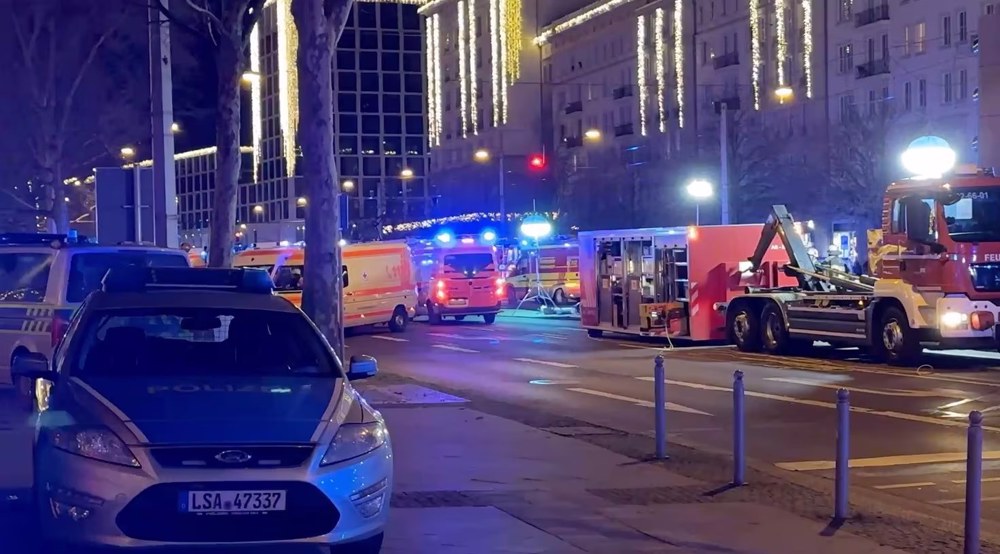Merkel’s party wins vote in North Rhine-Westphalia state
Chancellor Angela Merkel dealt a devastating blow to her main rival on Sunday, four months before national elections, when early results showed her party securing a strong win in a regional vote in Germany's biggest state.
Her Christian Democratic Union (CDU) clinched 34.3 percent of the vote in North Rhine-Westphalia, first results showed, snatching control of the sprawling industrial region which has been a Social Democratic Party (SPD) stronghold for decades.
The SPD only managed to garner 30.6 percent, sharply down from its 2012 score of 39.1 percent, in a serious hit to confidence ahead of general elections in September.
SPD Deputy Chief Ralf Stegner called it a "very dark day for the SPD" but said the game is not over.
"The boxer SPD has received a serious punch but is still standing," he said.

With a fifth of Germans -- 13.1 million -- eligible to vote in North Rhine-Westphalia, an election in the western state is always closely watched.
It carries even higher stakes this year, being the last regional vote before national polls and having a direct impact on whether the SPD can close a nationwide gap of around 10 percentage points with the CDU.
"We are going into the national elections with a lot of confidence," said lawmaker Michael Grosse-Broemer, who heads the CDU parliamentary group in the Bundestag, noting that the latest win gave the party an extra boost.
But the results marked a huge blow to Martin Schulz, who had generated a strong surge in support for the SPD when he took over the party in February.
Schulz himself had acknowledged the importance of Sunday's vote after casting his ballot in his hometown of Wuerselen.
"The result today is above all one of the regional elections in North Rhine-Westphalia. But it's a vote that will have an influence, there is no question about that," he said.

The SPD had already suffered two setbacks since Schulz took over, with the CDU scoring strong victories in the small states of Saarland and Schleswig-Holstein.
But the NRW setback may raise serious questions on the center-left party's strategy.
Schulz, who held more than 30 rallies in the state, had hoped that his push for "social justice" would resonate in NRW, which has lagged behind western Germany economically.
He argued that many people are struggling in temporary or low-paid jobs even though the country as a whole is growing richer.
But Merkel, who had also gone all out to sway the state of 18 million people, including 4.2 million of migrant origin, took aim at Schulz's arguments.
Her party, she said, offers "justice in the sense of jobs, strong budgets, funds for local communities".
She had urged voters to look at her government's economic record, noting that with 7.5 percent unemployment, the state fares worse than the national rate of 5.8 percent.
The CDU has also accused the state's SPD-Green governing coalition of security failures.
State interior minister Ralf Jaeger has faced criticism for failing to detain Anis Amri, the Tunisian asylum seeker suspected in the deadly Berlin Christmas market rampage last year.
Amri had lived in the state and was deemed a threat by intelligence officials, but Jaeger argued that there was insufficient evidence to lock him up.

On Jaeger's watch, Cologne also became the scene of mass sexual assaults by groups of mostly North African men on New Year's Eve of 2015-2016, inflaming the debate over the 890,000 asylum seekers Germany welcomed in 2015.
Meanwhile, the populist AfD (Alternative for Germany), which has railed against the migration influx, on Sunday secured its first seats in North Rhine-Westphalia, which would see it represented in 13 of 16 state parliaments.
Liberal party FDP also saw a revival, polling at 12 percent in NRW, after being consigned to political wilderness when it failed to cross the five-percent hurdle in national election in 2013.
(Source: AFP)
VIDEO | Yemenis praise the military for its successful operations against Israel
VIDEO | Israel continues to bomb Gaza homes
VIDEO | An insider's view of the country: Meybod City in Yazd
‘All wars have rules. All of those rules have been broken’ by Israel
VIDEO | Report flags India’s violation of rights of Rohingya detainees
Turkey's foreign minister meets Syria's de facto leader in Damascus
VIDEO | US Syria plots
'Next to impossible' to rescue patients from Gaza's Kamal Adwan Hospital: Director












 This makes it easy to access the Press TV website
This makes it easy to access the Press TV website